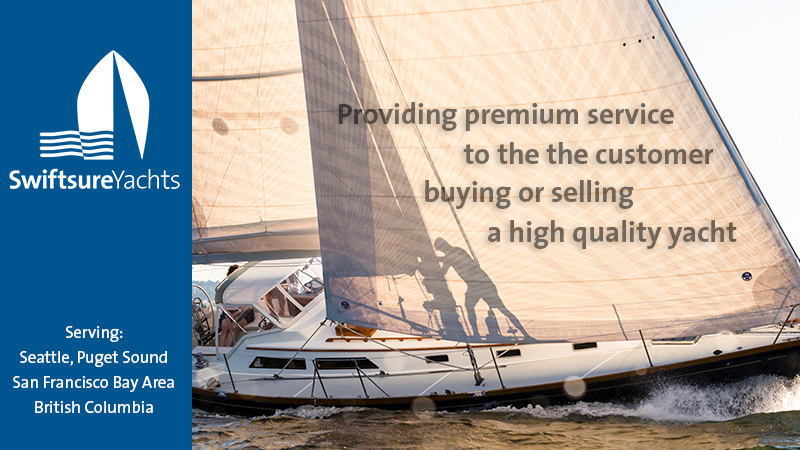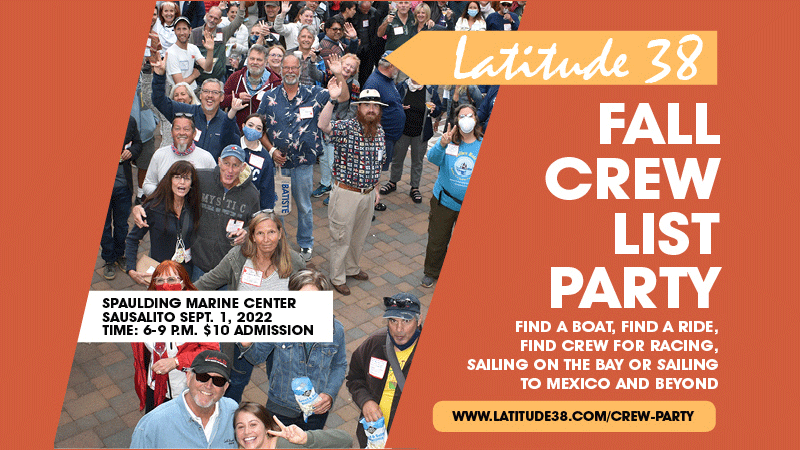
One Year of Good Jibes — and Many More To Follow
Latitude 38′s Good Jibes podcast has officially turned one year old.
The launch of Good Jibes was a year in the making, throwing ideas around and finding the right team. We knew that we did not want to compete with our favorite sailing podcasts like Out The Gate and On the Wind, but to add to the space in a positive way. We wanted to stay true to Latitude’s ethos and provide conversations from different perspectives, with six hosts sharing the mic and contributing to the project.
The first episode aired on August 25, 2021 — an interview with Latitude 38 publisher John Arndt by Ryan Foland. We wondered if people would listen, how it would be received, and then wondered: Whom should we interview next?
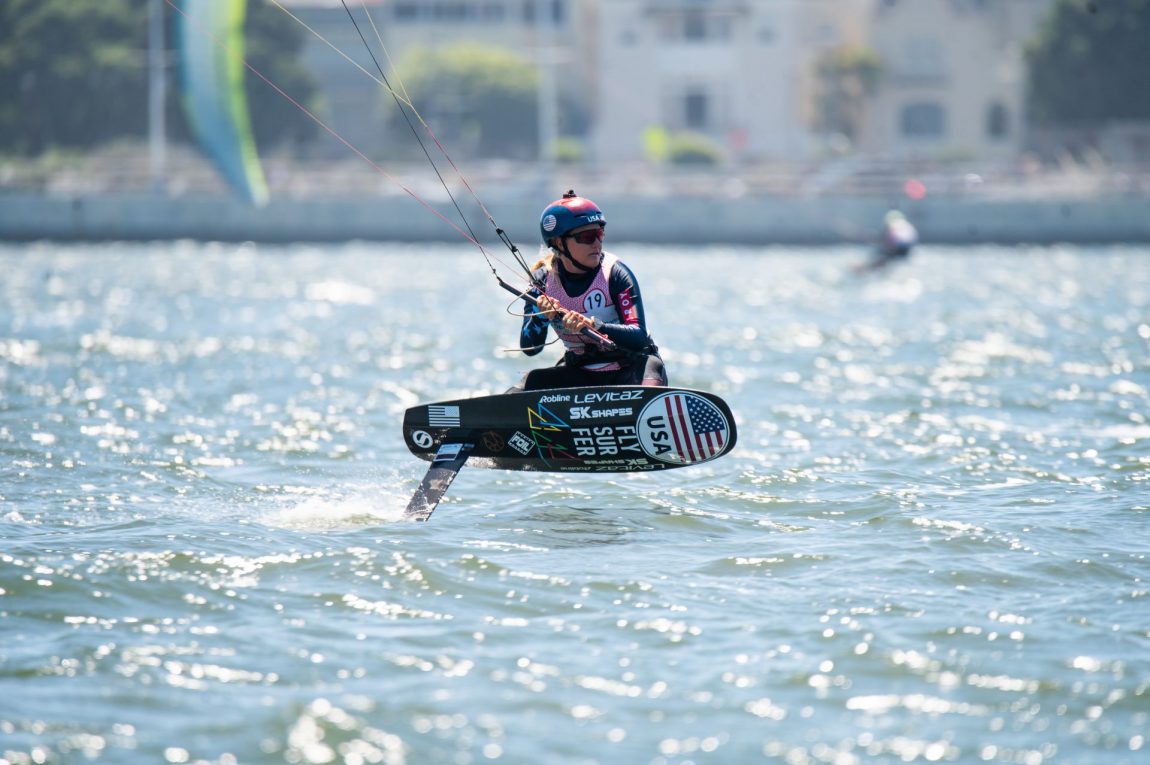
One year, 54 episodes, and 42,000 downloads later, we are happy to report that you did listen, and we hope you have enjoyed it as much as we have enjoyed creating it. Our team of hosts includes John Arndt, Ryan Foland, Moe Roddy, Ross Tibbits, Christine Weaver, and Nicki Bennett. Together and individually, they have recorded conversations with a varied array of sailors, from iconic circumnavigator Lin Pardey and Sailing Totem, who circumnavigated as a family, to double amputee solo circumnavigator Dustin Reynolds. We’ve spoken with racing legends Roy Disney, Katie Pettibone, and Peter Isler. There have been inspiring conversations about making careers in sailing, chasing big goals, keeping it simple, and the healing nature of simply being on the water. The guests’ backgrounds and sailing résumés are as varied as they come.
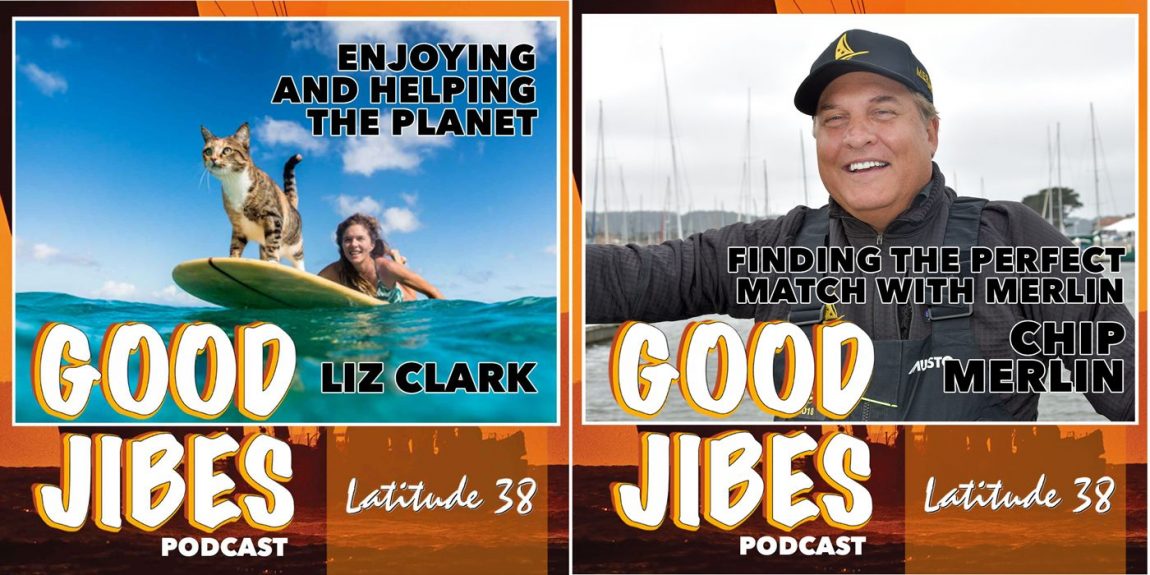
In reviewing our first year of podcasting, we decided to ask our hosts for some of their takeaways.
Latitude’s John Arndt has been both a guest and a host. A lifelong sailor who has worked for decades in the industry, John has a lot of experience to draw from. “I’ve really appreciated this new way we’re interacting with our audience, and also the different voices and perspectives that come through from both guests and hosts. Conversations range from technical to emotional to practical to historical and hysterical. Despite these different twists and turns from competitive racers to offshore cruisers, everyone’s path into sailing is both different and shared, and common themes result.”
Ryan Foland is an author, podcaster, speaker, and sailor. Before Ryan joined the team, the concept of Good Jibes was no more than an internal conversation circulating at Latitude 38. Ryan helped raise the sails for the Good Jibes podcast and was a key driver in getting the project off the ground. Ryan has many takeaways, but one that stood out to us is what a difference these conversations have made in his own approach to sailing and boat ownership. “Echoed in many episodes, such as with Chuck Hawley, Lin Pardey, Paul Dorsey, Captain Donald Lawson, and Fred Huffman, I think one piece of wisdom that has resonated is the fact that keeping things simple is a superpower on a sailboat. Keeping this in mind, I’ve really started to evaluate my list of boat projects in a new way — I’ve noticed that I am asking myself questions like, ‘Do I really need this? Could I do without? Could I use something I already have? Is this setup simple enough so that if it breaks, I can fix it?'”
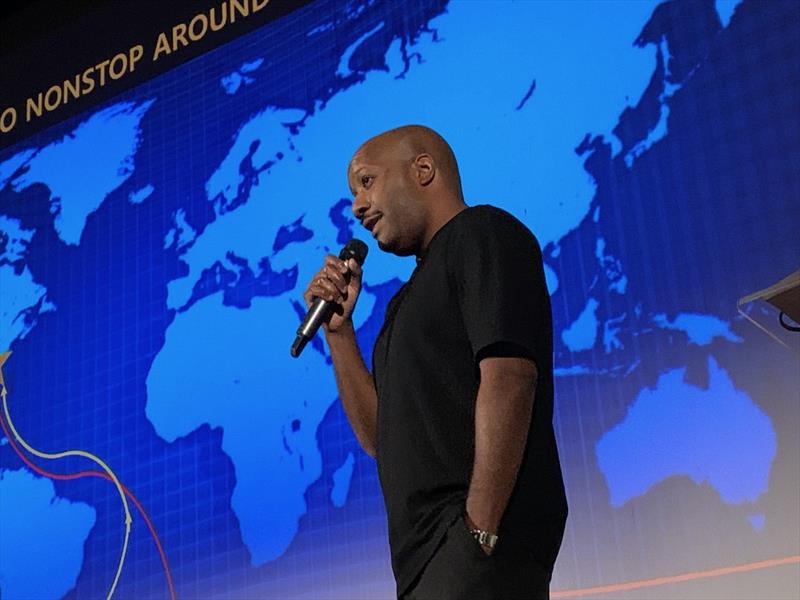
Part of our success in releasing Good Jibes was not just finding hosts and contacting our friends in the sailing world for interviews, but finding the right person to produce it. Once Max Bransetter of Max Podcasting came on board, we were ready to start on this journey. We asked Max his thoughts on the last 54 episodes, since he edits them, and undoubtedly has the most intimate knowledge of each and every episode and guest. We asked what Max’s favorite episode has been. “The most inspiring conversation was with Dustin Reynolds. That episode will change your perspective on life. Speechless.”
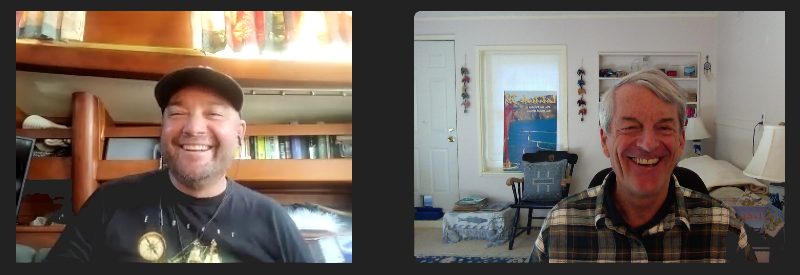
Lastly, we asked host Nicki Bennett her thoughts on the last year. Nicki is Latitude 38’s sales and marketing manager who, for a year, pushed the idea of a podcast, and waited patiently for the right team to form. “For me, producing this podcast, much like learning to sail, has been one of the most intimidating and inspiring things I have ever done. Seeing parts of yourself in someone who has crossed multiple oceans, and done incredible things, levels the playing field. Suddenly your big dreams seem more attainable because everyone starts somewhere.”
Now that you have heard our thoughts on making Good Jibes, we would love to hear your feedback about the podcast, and any recommendations you have for future guests. Thanks for listening. We look forward to continuing to create interesting and inspiring conversations.
Don’t forget to subscribe and leave us a review.
- General Sailing
- Current News
- Maritime History
- Community Sailing
- Youth Sailing
- COVID-19 Sailing
- West Coast Sailing
‘Seaward’ and ‘Matthew Turner’ Continue To Make Their Appointed Rounds
The Greek historian Herodotus, regarding messengers in the Persian Wars, noted that “neither rain nor snow nor rain nor heat nor gloom of night stays these couriers from the swift completion of their appointed rounds.” Sausalito-based Call of the Sea’s educational ships, schooner Seaward and tall ship Matthew Turner, didn’t have to contend with sleet or snow, but a couple of years of COVID restrictions, plus a deepening recession since January 2022, have taken their toll and (as for many other organizations) made it a challenge to “complete their appointed rounds.”
Regular programs were either canceled or severely limited by federal, state and often local health mandates. And even when COVID-19 seemed to be winding down there have been supply chain issues, a sputtering economy, and what some feel is a “general public malaise.”
Yet, the 82-ft schooner Seaward and the 132-ft tall ship Matthew Turner are giving everything they have, and then some, to keep their nonprofit educational youth sailing programs on track. And if recent progress was any indication of their efforts, thanks to dedicated crews and a veritable “army” of volunteers, so far it’s been a resounding success.
Seaward spent much of July on a three-week Camp Sea Lab program in Monterey. Camp Sea Lab had been a successful program in years past, and very popular with participating students. Then COVID put a hold on programs, followed by funding issues. But thanks to generous scholarship grants, the program is not only back up and running, but appears to be even more successful than ever.
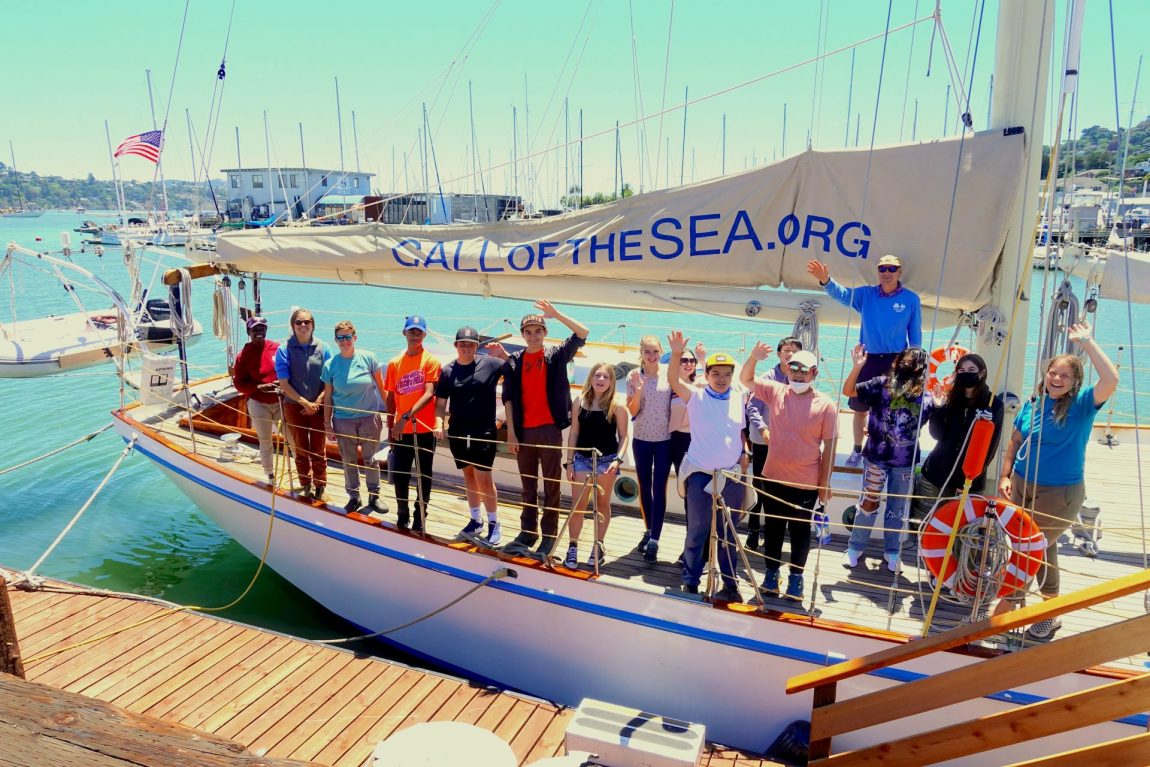
Back in Sausalito, it’s constant work on both Seaward and Matthew Turner.
Seaward is looking great. Volunteers are keeping up with maintenance and projects when the ship is at the dock between sails. The crew have varnished the rails and done some rigging work. The ship also has a new RIB, which is a US Coast Guard requirement. And her captain, John Boscoe, formerly with Freda B, is doing a great job.
Matthew Turner is sailing on the Bay under the command of captain Adrian McCullough, mate Rebecca Johnson and the crew, running weekly — and often daily — educational sails.
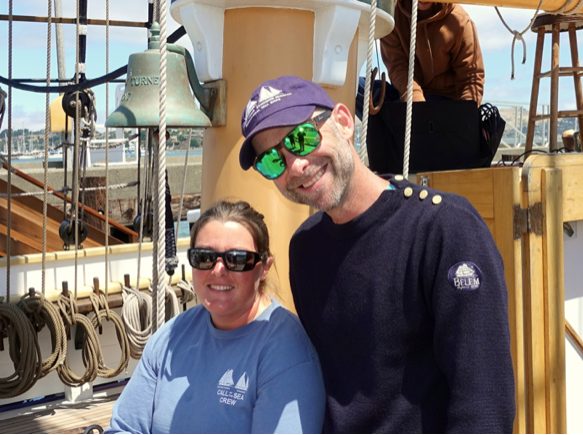
Students taking part in onboard marine science and environmental programs, and passengers who join the maritime history and heritage sails, both young and old, all enjoy the experience aboard the brigantine. And back at the dock, a dedicated group of longtime volunteers are constantly working on myriad ship projects and maintenance.
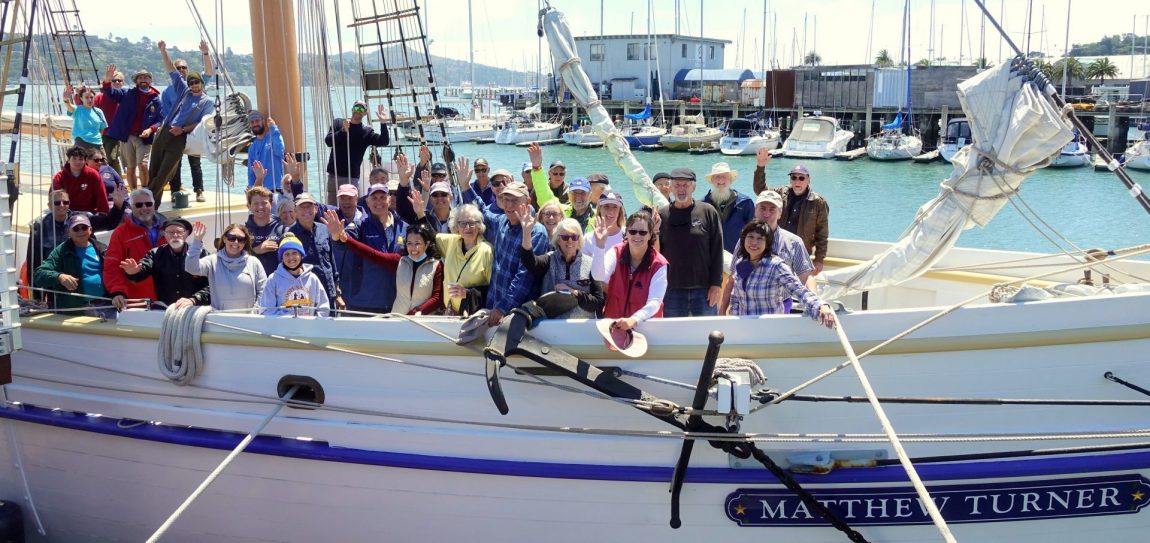
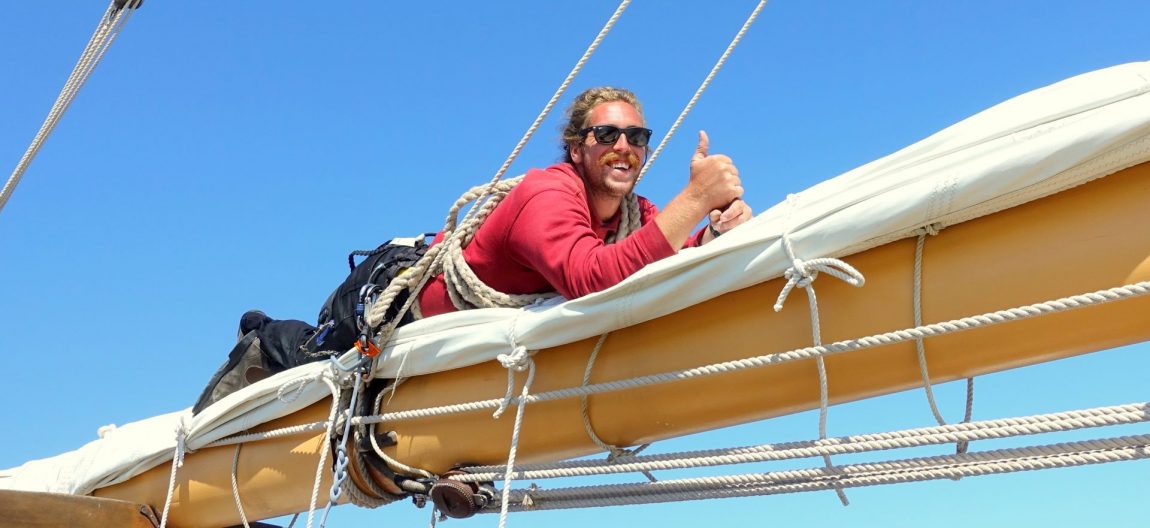
Learn more about Call of the Sea and its educational and community sailing opportunities here.
Quality Yachts With Premium Service From Swiftsure Yachts
Swiftsure Yachts offers exceptional service, quality brokerage boats and new yachts for world cruising. Visit our website swiftsureyachts.com.
The 2022 Ronstan Bridge to Bridge — a Wild Ride
The West Coast is famous for its legendary downwind races. Most of them, like the Transpac, are hundreds or thousands of miles long, and are raced with large crews over many days. One of the other epic downwind races in the West takes about 10 minutes to complete and is raced by single sailors on boards less than two meters long. The Ronstan Bridge to Bridge was started in 1998 to see who was the fastest on a downwind burn from the Golden Gate Bridge to the Bay Bridge. One way, on whatever you had, and go for it. The first year it was won by Jonathan and Charlie McKee on a 49er in 27 minutes and 18 seconds. Since then it’s been won by windsurfers, kiteboards and Australian 18s, and since 2016 by kite foilers, with the record now set at 9 min 32 sec. Fast!
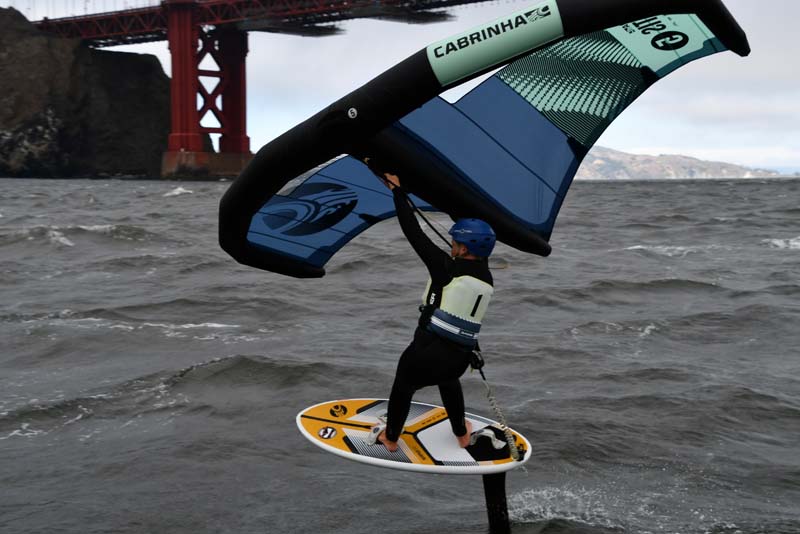
While foiling kites seem to have a lock on being first to finish forever into the future, that doesn’t mean others don’t want to come out for the challenge. The event is usually held Thursday evenings at 5 p.m. at the end of August, generally guaranteeing a stiff breeze and raucous conditions. Ebbs, floods, ship traffic, and 40 or 50 competitors traveling at 20 to 30 knots on fine-edged foils, some with strings attached, make for a complicated starting scenario. Do you wonder why people do all that shouting on a five- to seven-knot wind at the starting line?
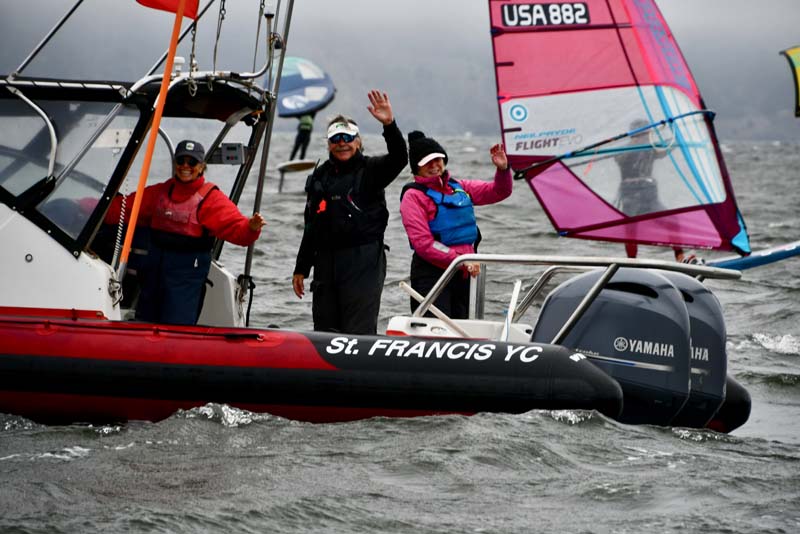
Kudos to the St Francis Yacht Club race committee, which fields a fleet of about five RIBs to launch the start and sweep the course of a quickly-scattered fleet of foiling wings. It’s a three-minute start sequence, then they all compress for that final horn. Moments later the committee and crash boats are left behind in the spray as the fleet fans out across the Bay. It’s a spine-compressing ride to keep up and keep an eye on it all.
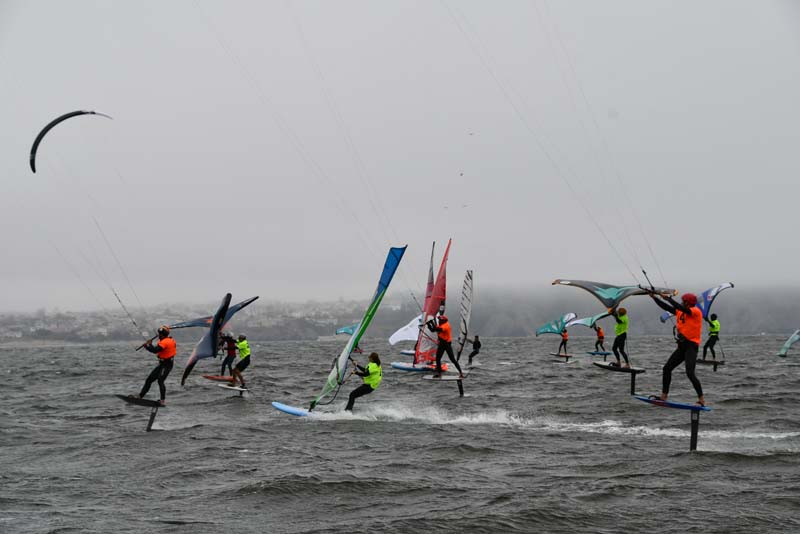
It was a fading ebb at the start this year when windsurfers, kiteboards, and wings put the pedal down and headed east for the Bay Bridge, hoping to stay low and fast to make it without jibing in one long, downwind run. That means start close to the committee boat by the North Tower and somehow go low and go fast. The record-setting year had a more southerly wind, making the one long reach easier to hit. It also had a flat-water flood.
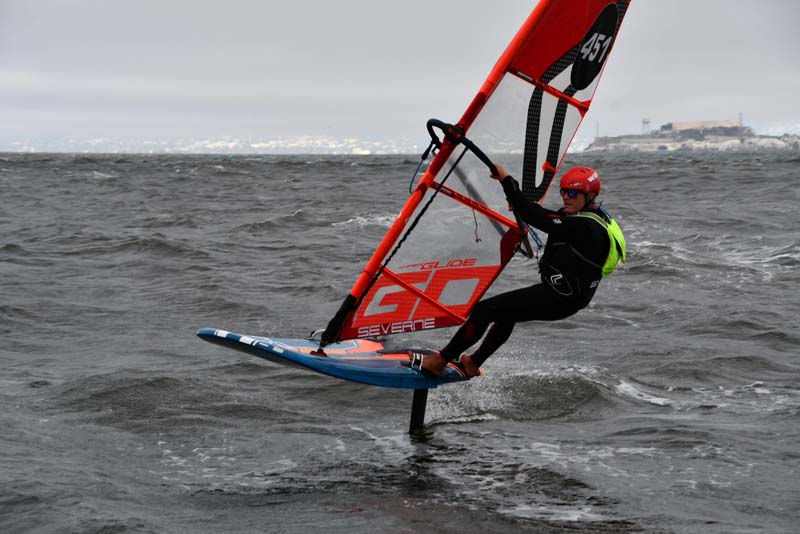
The MOD 70 Orion raced in the past, and numerous other speedsters have joined in, but for the past couple of years it’s only a board game with three classes, including windsurfers, wings and kites. This year Xavier Ferlet was a repeat winner of the windsurfing division. He was a little off his last year’s pace, but his time of 17 minutes and 32 seconds was still 10 minutes and 30% faster than the first-year winners in the 49er. Demonstrating shifts in the wind toys, the rapidly growing class of wing sailors was the largest, with 22 competitors signed up and 18 hitting the line.
The actual first part of the race is rigging up the perfect kite, sail or wing at Crissy Field for the fastest possible downwind ride from the Gate to the Bay Bridge. The only problem is the fastest downwind sail is less than ideal for getting from Crissy Field to the start line. On the winner’s podium, wing-sailing fleet winner Joey Pasquali described getting a perfect 8.5-meter wing ready for a great downwind ride with one of his biggest challenges of the evening getting from Crissy to the starting line, which, naturally, crosses the windiest part of the Bay. The perfect sail downwind is not the perfect sail upwind, and the perfect sail at the Golden Gate is not the ideal sail as the wind fades toward the Bay Bridge. There are no sail changes in a 10-minute race. Joey’s time of 17 min and 30 sec was just 12 seconds faster than Xavier’s windsurfing time.
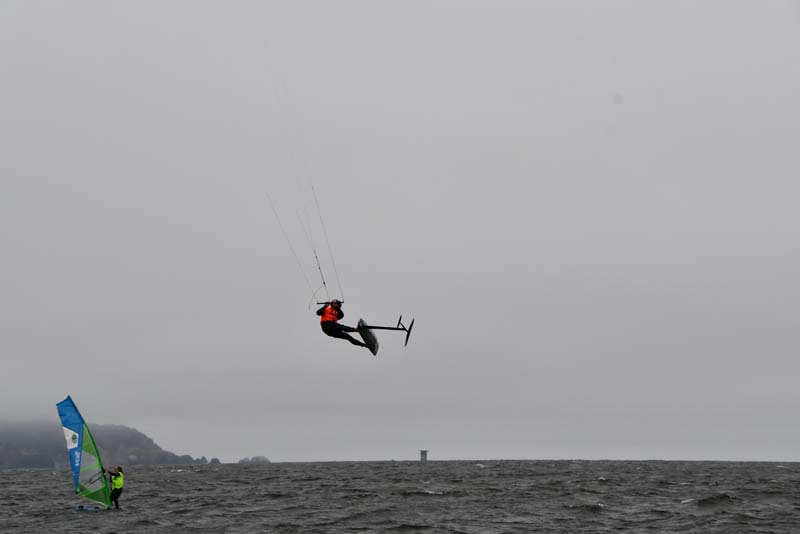
Foiling kites again showed their dominance, with nine foiling kites quickly leaving the rest in their vapor trail. The start is always important, and Markus Edegran nailed it, crossing with the horn at the committee boat at full speed. Xantos Villegas was just behind him at the start, and they each had just over 10 minutes to the finish to figure out the tactics, strategy and sail trim, and avoid all the potholes on the course.
Markus was higher, Xantos lower and going for the no-jibe straight shot from start to finish. Markus eventually decided he had to jibe to get low while Xantos carried on his “straight-line” course. At 25-30 knots you don’t do a lot of looking around for competitors, so they separated, with Markus finally jibing back to head for the line. He was low and fast while Xantos was a bit slower and higher, but on the shorter course. Markus crossed the line, heard the horn, and seconds later heard a voice over his shoulder wondering who was so close and who’d crossed first. It was first-time participant Markus, nipping Xantos at the finish by seconds. It was a photo finish, captured on Xantos’s GoPro.
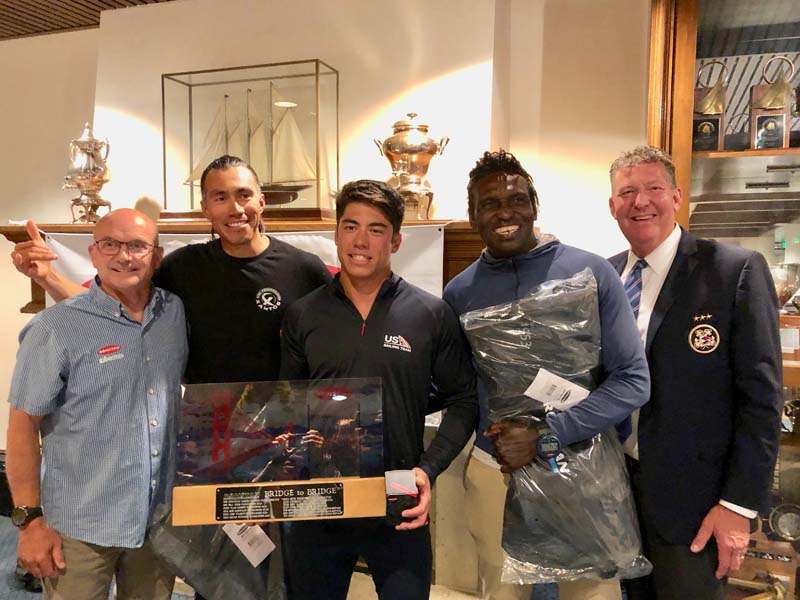
Over time, records get harder to beat. Technology advances get smaller, and the right weather windows are rare. Regardless, the challenge to beat your competitors and have a shot at a record always remains. It may be the shortest, fastest one-way race in the world, but it remains one of the West Coast’s legendary downwind rides.
Thanks to Xantos Villegas for capturing both the start and finish of this year’s Bridge to Bridge run. In the midst of all this action he was also filming.
The start was cold, windy, foggy and fast.
The finish was slightly warmer, a little less windy and foggy, but still pretty fast.
Kevin Burnham Memorial Grants and Award
The US Sailing Foundation is accepting applications for the newly established Kevin Burnham Memorial Grant. They’re also welcoming nominations for the Kevin Burnham Memorial Award. The deadline for grant applications and nominations for the award is September 30, 2022.
Kevin Burnham was a 2004 Olympic gold medalist and 1992 Olympic silver medalist in the doublehanded dinghy 470 class. He was the oldest gold medalist at the 2004 Summer Olympics in Athens. He passed away from pulmonary disease in 2020 at the age of 63.
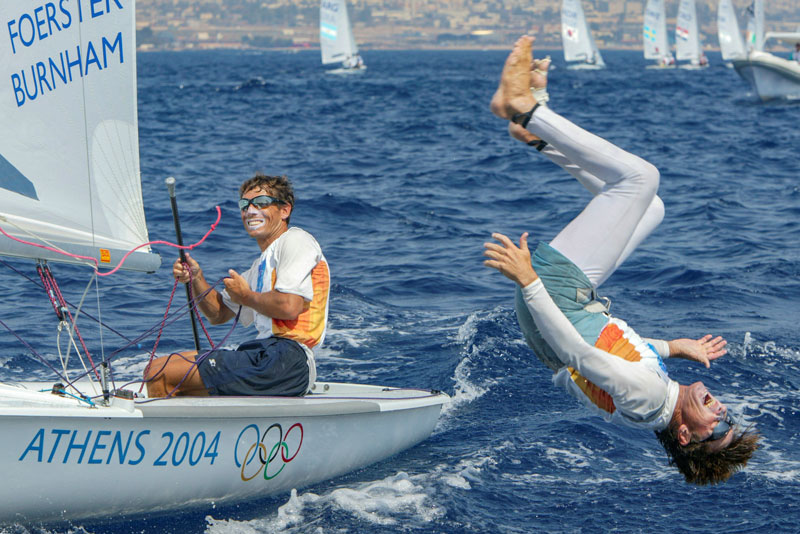
Grants
The Kevin Burnham Memorial Endowment Fund, set up under the umbrella of the US Sailing Foundation and Project Pinnacle, funds the grants. Grants are open to sailors aged 31 and under who demonstrate outstanding competitive sailing potential, display an infectious enthusiasm, and compete in two-person Olympic-class or Olympic Development-class trapeze boats. The selection committee may award one grant or several grants based on the applications received and the available funds.
Award
The Kevin Burnham Memorial Award is separate from the grants. The award is given to a competitor (or team of competitors) best exemplifying Kevin’s spirit, demonstrating passion, perseverance, persistence, sportsmanship on and off the water, love of the sport, and love of his/her competitors. The recipient can be of any age and must currently sail, or previously have sailed, an Olympic-class boat. Award recipients’ names will appear in the US Sailing headquarters in Bristol, RI, on a perpetual plaque displayed beside the Olympic torch that Kevin carried in the 1996 Games. Leo Boucher received the inaugural Kevin Burnham Memorial Award earlier this year at St. Francis Yacht Club.
The foundation will accept award nominations and grant applications electronically or via mail until September 30, 2022. To nominate yourself or another candidate for the Kevin Burnham Memorial Award or to apply for a grant, click here or call Lorie Anderson at the US Sailing Foundation at (401) 342-7943.
To remember Kevin with a gift to the Fund, click here or contact Jill Nosach at the US Sailing Foundation at (401) 342-7922. Contributions are tax-deductible in accordance with the law.
About the US Sailing Foundation
The US Sailing Foundation is the fundraising arm of US Sailing. It’s committed to the advancement of US Sailing in a variety of ways, including soliciting support for and promoting US Sailing programs, services and activities. For more information, visit www.ussailing.org/about/ussf.
Join Us for the Fall ‘Baja Ha-Ha’ Crew List Party
The Latitude 38 Crew List Party is returning on Thursday, September 1st at the Spaulding Marine Center. Join us for an evening of mingling with other sailors. Find a boat, or find a ride for sailing on the Bay and beyond. Get your tickets and more info here.

